-
ANOTHER CHILD 미성년 ( Kim Yoon-seok 2019)
KIM YOON-SEOK: ANOTHER CHILD 미성년(2019)
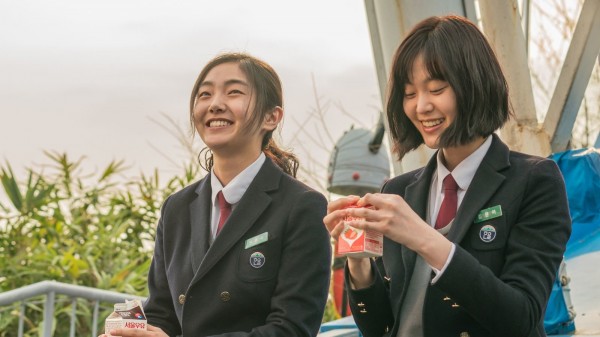
KIM HYE-UN AND PARK SE-JIN IN ANOTHER CHILD
Two teenage girls struggle through their dysfunctional parents' affair and an unplanned pregnancy
This directorial debut by new Korean director (and previously well-known actor) Kim Yoon-seok confronts adultery and the results of an unplanned pregnancy mainly (but not exclusively) from the point of view of two teenage girls "caught in the crossfire." They are not friends, but go to the same school. When the daughter of the woman who has become pregnant by the other girl's father Ju-ri (Kim Hye-jun) finds out about it, she gets in touch with Yoon-ah (Park Se-jin), the adulterous man's daughter.
Ju-ri's married father Kwon Dae-won (played by directorKim himself) is having an affair with Yoon-ah's single mother Kim Mi-hee (Kim So-jin), who owns and runs a restaurant specializing in duck. After she's found out what's happening by spotting her father with Kim Mi-hee , Jun-ri snatches her phone from Yooh-ah to tell Yooh-ah's mother, Yeong-ju (Yum Jung-ah), about the affair.
This may momentarily suggest an alliance of wronged children, but note that it starts with a provocative gesture, and that the two girls were not friends to start with. Since the two girls represent, as it were, different interests in the affair, hostility develops off and on, till there is an alliance again after events have gone badly for the parents. It takes time and events for a sympathy to develop. No one seems to seek help. No collective wisdom comes into play, including, except for one confession scene with Yeong-ju, the church.
Kim Mi-hee decides to have the baby, meaning Yoon-ah is going to have a (much younger) sibling (the girls are around 17). But then Yu-ri's mother Yeong-ju (Yum Jung-ah) has a violent run-in with Mi-hi that seems to precipitate a premature birth. At first the girls become excited by the idea of the baby, a boy, kept in an incubator, but the boy does not survive. As this goes on Dae-won's marriage and his career as well seem to disintegrate, but he doesn't agree to see the mother again.
I think Yoon Min-sik, who wrote about this film for The Korea Herald, is right when she says of the younger actresses playing the daughters that "the chemistry is incredibly good and believable and that director Kim keeps Dae-won from becoming "a generic slimy bastard." However I had trouble getting any foothold on the action. It doesn't seem that Yoon min-sik's defense that the film "is not about what the characters are going to do or what is going on in the story, but their experience and how it affects their lives" quite makes sense. We in the audience have to deal with what happens in the film. (Yoon grants that the film "may not have the strongest story" and lacks catharsis.) And the final gesture with the baby's ashes, in he moment depicted in the picture above, seemed extremely strange and in vary dubious taste, the girls' sudden hilarity arrived at far too quickly. There are good moments here, and numerous encounters between people where sparks fly. But more work is needed next time from actor turned director Kim in the script and editing departments.
Another Child 미성년, 96 mins., debuted 11 Apr. 2019 in Korea; opening 4 July in Singapore. Screened for this review as part of the NYAFF.
NYAFF Showtime:
Thursday, July 11
8:30 PM
Last edited by Chris Knipp; 07-06-2019 at 10:19 AM.
-
A FIRST FAREWELL 第一次的离别 (Wang Lina 2018)
WANG LINA: A FIRST FAREWELL 第一次的离别 (2018)
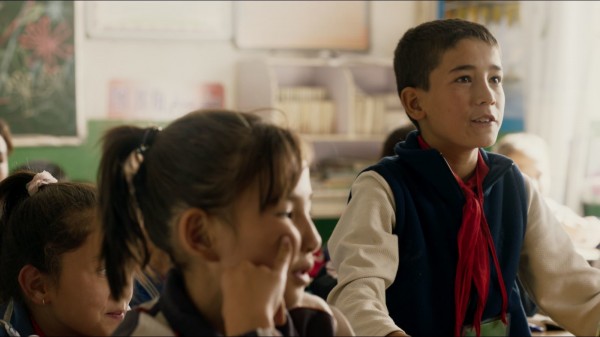
KALBINUR AND ISA IN A FIRST FAREWELL
Growing up and saying goodbye
The Uyghur people are a persecuted muslim minority in China. Filmmaker Wang Lina, whose debut feature this is, provides an intimate, beautiful picture of a vanishing life. She focuses on children living in a village on the edge of a desert in Xinjiang Autonomous Province. It's not idyllic, but there are moments of great sweetness and beauty. Begin with the sharp, alert features of the main character, Isa Yasan, a boy of ten or so.
Isa, an adorable, sweet, earnest youth. The youngest son of a goat-herding family, he helps his father (Yasan Kasimu) with farm work, herding goats, feeding animals, picking cotton. He also tends to his mother (Ugulem Sugur). An (meningitis) has made her not only deaf and mute, but mentally handicapped in some way that's not quite clear. Isa loves her very much. But one day on his watch she escapes and wanders off. He goes all over rather desperately looking for her. Isa's mom is a worry, and his father wants to put her in a nursing home. (So there is one, somewhere.) Isa goes to school, but maybe not enough. It seems he needs to learn Mandarin better. (We see him briefly in a class, where all chant under an instructor.) But it is the increasing imposition of Mandarin that is cutting off the Uyghurs from their own culture.
Isa spends his free time with his best girl friend, Kalbinur Rahmati, and they have a baby lamb they raise together. Moments they spend together are priceless. Filmmaker Wang Lina captures magic in this and some other scenes of A First Farewell, whose theme is that the world is somewhat leaving Isa behind. We see his older brother Moosa (Moosa Yasan) leave to further his education. This puts more burden of work on Isa. and what of his education, his future? But when we see him lovingly feed milk to a baby goat from a bottle, the moment is all.
Another priceless time is when Kalbinur is picking cotton with her parents (Tajigul Heilmeier and Rahmati Kranmu) and her father sings a poem he wrote for her mother. Kalbinur groves with it in a way that expresses the spirit of all music. And then her mother jokes and teases. Yet Kalbinur says they fight so much she's afraid they will divorce.
This film made me think of the incredible and somehow similar though more strictly documentary, Honeyland (ND/NF), a remarkable feat of humanistic ethnographic documentary filmmaking, which is coming to regular theaters soon (Friday, July 26, 2019). A First Farewell is as remarkable in its own way, more personal, and more staged, but also about a threatened, remote way of life seen from the inside. The filmmaker herself dedicates this poetic film to her own hometown of Shaya in Xinjiang.
There is a Variety review by Richard Kuipers, who relates this stylistically to "fine Iranian films such as Majid Majidi’s The Color of Paradise (1999) and noting that it's primarily geared for young viewers, while also "offering plenty" for adults who "to read between the lines." Indeed its simply, poignant, authentic scenes offer much to ponder, while bypassing Chinese censorship that would have been aroused by reference to the political issues of YUyghur life.
This film is a gem, and there is a top notch team behind it. The editing was by Matthieu Laclau, of Ash Is Purest White, the cool, understated score by Xi Wen, and the cinematography, shot over the period of a year, by dp Li Yong.
A First Farewell 第一次的离别 (Di yi ci de li bie), 86 mins. debuted at Tokyo Oct. 2018 (winning the Asian Future best film award) and also showed at the Berlinale Feb. 2019 and winning the Crystal Bear of the Generation Kplus section there. It was screened for this review as part of the NYAFF. In Uyghur and Mandarin.
NYAFF Showtime:
Thursday, July 11
6:00 PM
Last edited by Chris Knipp; 07-09-2019 at 05:11 PM.
-
FURIE/HAI PHUONG (Le Van Kiet, 2019)
LE VAN KIET: FURIE/ HAI PHUONG(2019)
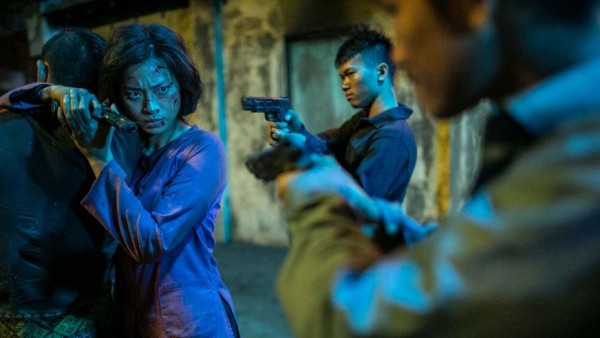
VERONICA NGO IN FURIE
Vietnamese superstar Veronica Ngo headlines as a mother looking for her kidnapped daughter in genre maestro Le-Van Kiet’s latest crime thriller.
VARIETY review by Elizabeth Kerr: "Another kidnapped child, another parent on a quest for revenge and/or justice. This time around the parent in question is a struggling Vietnamese single mom in writer-director Le-Van Kiet's Furie, a modest but engagingly familiar actioner that has just a fresh enough point of view to make it worth a look for fight fans. ...[an] ideal mix of fisticuffs, a wholly watchable lead, and being a selection from a country we see too little from outside Asia."
I found the shots of local landscape, rice paddies, greenery, wetland, and bush, and the villages just small enough to see crowded without having many people, very attractive and exotic, really feeling "Vietnamese," as if I knew what that was. I didn't find the villains attractive, and I found the heroine's struggle dogged rather than exciting. It was not I story that kept on giving.
Last edited by Chris Knipp; 07-13-2019 at 11:03 PM.
-
THE CROSSING 过春天 (Bai Xue 2018)
BAI XUE: THE CROSSING 过春天 (2018)
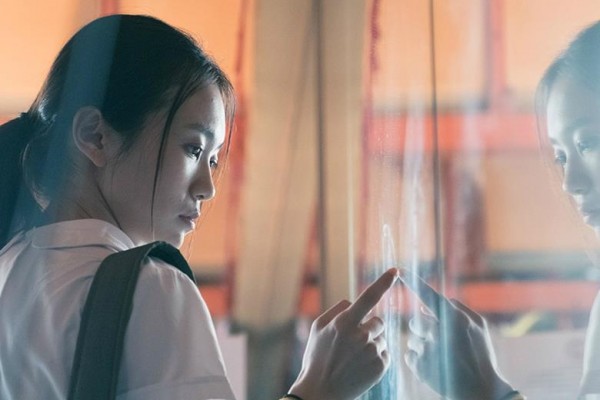
HUANG YAO IN THE CROSSING
Coming of age dangerously, between Hong Kong and China
Cath Clark of the The Guardian oddly sees this as an "elegantly elliptical arthouse movie" with "echoes of Sophia Coppola" that captures "the impulsiveness and impatience of teenagers." There is elegance in the bright color and intense, cool action, but this is "arthouse" only in the sense of avoiding conventional selling points like sex and violence. Bai Xue, in this distinctive, relentless, sometimes beautiful debut, seems almost too eager to show her no-nonsense, non-stop focus on action and process. This isn't about "teenagers" so much as a girl ambitious beyond her years and driven deep into risk-taking by the freedom of her situation. She is half Hong Kong, half-Mainland, one parent from each place.. As is typical in such cases, called danfei according the Clarance Tsui in his Hollywood Reporter review, Peipei (Huang Yao) lives (or sleeps) - a typical arrangement, Tsui says, in Mainland China, crossing over from Shenzhen to Hong Kong for school every day.
The girlish school uniform she wears every day provides perfect cover for what develops: Peipei becomes a mule, smuggling new iPhones to the Mainland. Her ostensible aim is to make money for a Christmas trip that Peipei and Jo (Carmen Song), her "poor little rich girl" best school gf, want to take to Japan. There, they excitedly imagine themselves on holiday sipping sake in saunas looking out at a snowy mountain. It's a fantasy. The reality is that the danger, the recognition of her special knack (her schoolgirl invisibility), and the excess of money earned, provide frantic compensation for the emptiness of her emotional life. Her mother (Ni Hongjie) drinks and plays mahjong all day. Her father works at night in a warehouse. Neither provides that warmth and support a child needs.
It is hard to know who's more driven, the young protagonist or the first-time c0-writer-director Bai Xue, who seems equally bent on impressing with her no-nonsense coolness and relentless focus on insider worlds. This film would have been a bit better leavened by the occasional pause for breath - that is, beyond the few pointed freeze-frames used here to underline that Peipei has crossed another line into the danger zone. But both actress and filmmaker impress with their complete assurance.
Alan Hunter (Screen Daily) describes Mrs Hua (Carmen Soup), the smuggling boss whom young Peipei, just turned sixteen, goes to work for, as "a 21st century Fagin with her own gang of thieving boys." An amusing idea, but Mrs Hua' is more like a treacherous, potentially dangerous den mother, supervising loosely a program of dangerous fun - perhaps an exploitation of that "impulsiveness and impatience of teenagers" Cath Clark spoke of, in which Peipei as her new pet. The more pivotal, subtly accumulating, attachment is the restrained but intense one between Peipei and her more experienced fellow smuggler Hao (Sunny Sun), whose ambitions extend beyond soldiering for Mrs Hua. Hao was Peipei's gf's bf, so when she takes a jaunt up the mountain with him that has a romantic, fun edge, there's going to be blowback.
And since this is a movie that's Peipei's non-stop action and very insistently does not pause for breath, the most memorable scene is the one, in a small room all lit in red, when Hao secretly prepares Peipei for a bigger, more dangerous crossing in a scene that's very intimate, the more so for not being (overtly) sexual or romantic.
It is this teasing closeness, one realizes, the epitomizes The Crossing as a whole. It's perpetually too intimate, perpetually crossing over some kind of line whose seriousness this ambitious, wayward schoolgirl is too inexperienced to sense and be frightened by. As is often the case, Huang Yao is by a fair margin older than her character, but she rarely gives that away. She is very good. So is Sunny Sun as Hao, close but always a big heartbeat away. Props to the filmmaker and dp Piao Songri for shooting constantly in the tumultuous, crowded settings so essential to this story: Mrs Hua's boisterous young crew of boys (well differentiated), the noisy classrooms, and the crowds on trains and at the border; and to the deft editing of Matthieu Laclau (a Jia Zhang-ke regular) that maintains the seamless rhythm and flow.
The Crossing 过春天 (Guo Chun Tian), 99 mins., debuted at Toronto Sept. 2018, also showing at Pinyao, Berlin, Dublin and Osaka. Screened for this review as part of the NYAFF.
Friday Jul 12, 6:00pm (Beatrice Theatre, SVA Theatre)
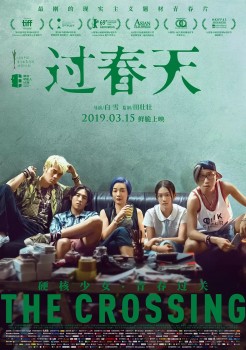
Last edited by Chris Knipp; 07-14-2019 at 10:55 AM.
-
MAGGIE 메기 (Yi Ok-seop 2018)
YI OK-SEOP: MAGGIE 메기 (2018)
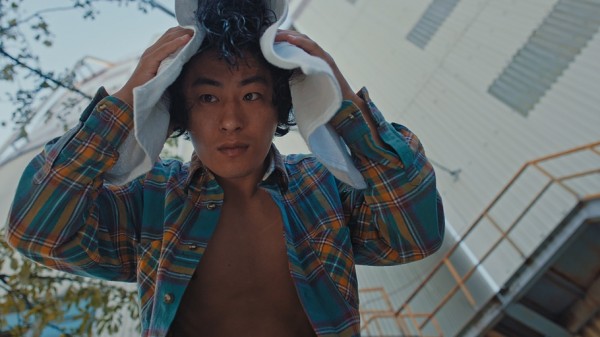
KOO KYO-HWAN IN MAGGIE
The fragility of trust
This first feature film uses as its springboard an X-ray photograph of two people caught in the act of having sex, but then spirals out into a story which takes in a talking fish, a relationship breakdown and a series of freak geological events in Seoul. The director is riffing on the idea of how misunderstandings snowball, but, without a solid central idea to anchor the wackiness, the exuberantly nonsensical chaos of this movie is likely to have only niche appeal. - Wendy Ide, Screen Daily.
ven the director's name, Yi Ok-seop, will have only niche appeal. However, there is something to be said, from the festival-goer's or cinephile's point of view, for niche appeal movies. They can be excellent palate-cleansers. And though the material here is fragile and lightweight, the thing, for the most part, of youthful ponderings, this is not much different from what Jean-Luc Godard did in his cinema. Yi Ok-seop simply goes her own way. Which is goofier and has less edge than Godard's. This does not have the drive and cohesion of Godard and is a bit on the fey and quirky side. Bit there is a questioning, philosophical quality and the whole approach shows originality.
The subtitle ofMaggie is The Fish Who Saved the Planet. It's a catfish, and it's a voiceover narrator of the film - as a planet-saving fish has every right to be. The action starts at a private hospital that follows rather it's own rules. None of the staff eat at the cafeteria. All go out for lunch. In the quiet, a couple have sex in the X-ray room. The X-ray machine fires off, and shows a couple fucking. Zap! Nurse Yoon Young (Lee Juyeong) believes, erroneously, that it is she and her slacker boyfriend Sung-won ((Koo Kyo-hwan) ) who feature in the now notorious image. Shocked, she goes in next day to resign. But all the staff are taking the day off, except her boss Dr Lee (Mun Sori). Are they all guilty, or are they sick as they tell Dr Lee? The debate that ensues introduces the film's theme of doubt. (There is never any certainty about who was captured in the X-ray.)
From here on the film follows its own jagged narrative line, which wanders from one subject to another. Norse Yoon Young does things and has discussions wTih Dr Lee. Then there's an odd event that produces sink holes all over Korea and Sung-won gets a job filling them, when he loses his ring that Yoon Young gave him. He lies about it to her. Yoon Young agrees to meet with Ji-yeon, Sung-won's (less pretty) former gf. Then there is the strange case of the sinkhole-filling co-worker and the ring. Then Yoon Yeong and Sung-won fight. "Doubt" can also be interpreted as "bad faith," and it can be the element that undermines a relationship.
The momentum falters occasionally here, but this is original, valid work. This is young, questioning, imaginative cinema that has something international about it. The cast members have charm, and that counts for a lot.
Maggie 메기 ,88 mins., debuted at Busan in 2018, winning two awards, and played also at Rotterdam and Osaka, winning best picture at the latter, and Fantasia and NYAF. It was screened at the latter for this review.
A NYAFF showtime: Saturday Jul 13, 3:00pm
SVA Theatre
TRAILER
Last edited by Chris Knipp; 07-15-2019 at 07:19 PM.
-
FIVE MILLION DOLLAR LIFE 五億円のじんせい (Moon Sung-ho 2019)
MOON SUNG-HO: FIVE MILLION DOLLAR LIFE 五億円のじんせい (2019)
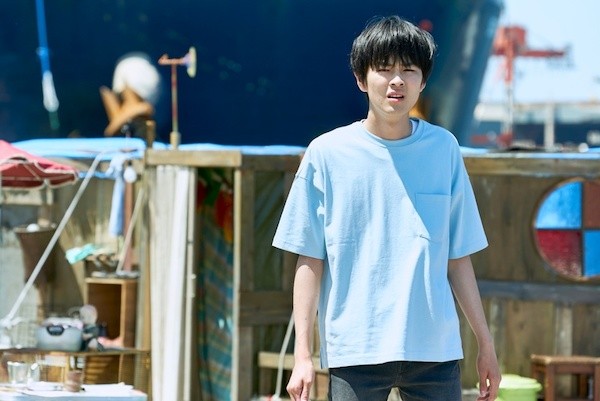
AYAMU MOCHIZUKI IN FIVE MILLION DOLLAR LIFE
A boy who is a magnet for kindness
The young director Moon Sung-ho, who is from Hiroshima, returned to his South Korean roots to study filmmaking in Seoul after high school in Japan, then returned to Japan to make this debut feature. TV writer Naomi Hiruta has provided a screenplay that's a weird mixture. It's about a suicidal 18-year-old heart transplant survivor, a saccharine and upbeat story (Mirai, the tall, wispy protagonist played by Ayumu Mochizuki smiles all the time) that conceals what the blog Genkinahito calls a "dark heart" - a continual preoccupation with suicide.
Mirai had a heart transplant when he was seven, financed by donations of $5 million from the community, and this drama was exploited by TV, which keeps on milking the story every year on the youth's birthday. He is depressed, feeling like a shell, not able to live up to expectations or repay the debt. Right when gushy locals and the media are making him feel like a fraud again, a troll called Kiyomaru on Mirai's smart phone sends him taunts about not being worth the money it cost to save him and deserving only to kill himself. There are several perennial Japanese themes here, excessive humility and suicidlity (perhaps close-linked?) with new ones of tech-crazed youth and homelessness, and more. A rather low view of Japanese life seems embedded in the idea that it costs a million-something to bring someone into the world and the average Japanese citizen makes about the same amount in a working life. What's the point of slaving your lifelong as a salaryman only to break even? By this kind of reckoning Mirai's life has been more costly than this, and it will take him 171 years to repay the debt by normal work.
Seeking some vague get-rich-quick scheme, Mirai runs away and has adventures, abandoning his plan to study medicine, and seeking naively to make back the money he somehow now thinks he "owes." It's a cockeyed idea, just a fantasy rom-com gimmick, but it provides a premise for sprightly changes of scene from a seemingly kind homeless man who empties his ATM account to day labor, to being a toy boy for pay in the city, falling in with kidnappers, and so on for a while.
This road-picture coming-of-age film may be contrasted with the more profound schemework of Ikiru, another movie about dying and the value of life. Unlike Mirai, Watanabe-san, the protagonist or Akira Kurosawa's masterpiece, has only a few months to live to begin with, and seeks the best way to spend his remaining time, which in the end turns out to be right right at his humble city hall job, striving to do good by insisting that a small park be built. Both characters explore a series of different activities that test life's diverse possibilities and their responses to them. One is entertainment, the other is art.
Ikiru is ennobled by a magical combination of its maker's cinematic genius and a profound humanistic worldview. 5 Million Dollar Life is more concerned with skewering insincerity and media exploitation but wastes time focusing on a superficial monetization of the value of Japanese life. Maybe the real point is Mirai is sick of being exploited. Anyway this road movie coming-of-ager is a dramady that loses its moody point in enjoyable picaresque exploits and displaying its protagonist's irresistible innocence and charm. The lead actor Ayumu Mochizuki projects an freshness and sweetness that make things charming light. Sexploitation and a grim yakuza cleanup somehow don't soil him.
The film delivers a message, Hirai's discovery: the world is divided not into nice people and not nice people but into people who're worth being nice to and those who aren't. And he? He is one who learns he survives on kindness, and people naturally want to be nice to him. But how long can anyone be adorable and innocent, and how long can we endure such a character? The truths in Five Million Dollar Life are facile, but as with any picaresque tale, there is amusement in the lively adventures and the hero's durability.
If Moon Sung-ho can't ennoble or enlighten, he certainly can entertain and he may be one to watch. I hope he pares away the saccharine life lessons next time and embeds his truths instead in the images and action.
Five Million Dollar Life 五億円のじんせい ("500 million yen"), 112 mins., releases July 20, 2019 in Japan. It was previewed as part of the NYAFF for this review, where it showed July 11.
Last edited by Chris Knipp; 07-16-2019 at 12:43 AM.
 Posting Permissions
Posting Permissions
- You may not post new threads
- You may not post replies
- You may not post attachments
- You may not edit your posts
-
Forum Rules





 Reply With Quote
Reply With Quote






Bookmarks